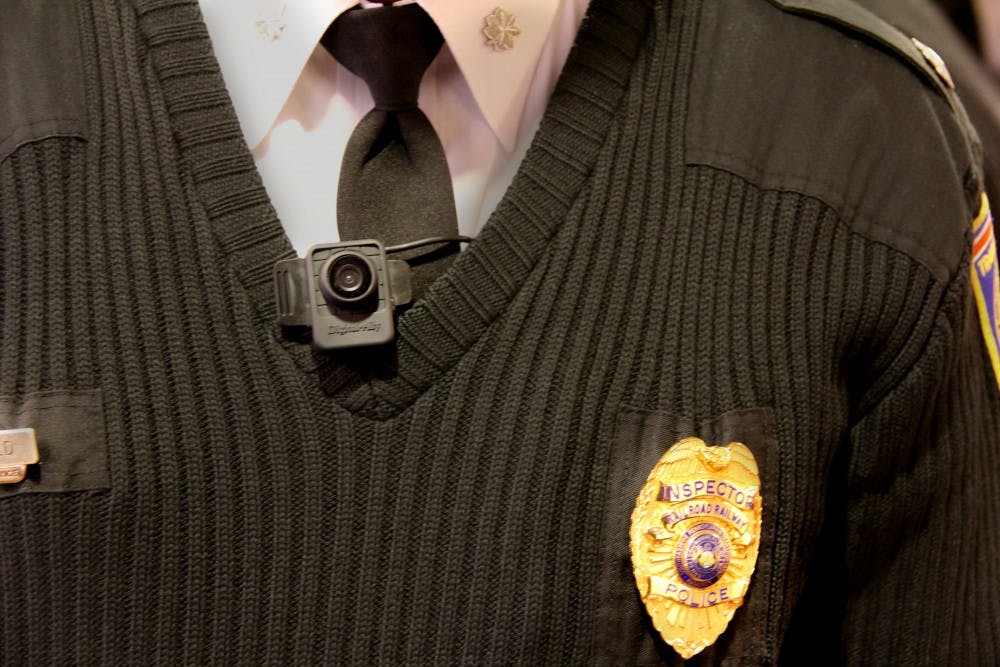
SEPTA police officers will now wear body cameras when they are on duty. | Courtesy of SEPTA
As the national debate surges on whether state and local police should wear body cameras, SEPTA Transit has already put a plan in action. SEPTA police officers are now equipped with body cameras that will be turned on while responding to radio calls and during any interaction with people on patrol.
The SEPTA Board approved the $400,000 permanent program in July after a six-month pilot stage last year, which tested 10 different camera models. Since the beginning of January, 289 SEPTA Transit officers have been using Digital Ally First VU body cameras.
Jordan Hyatt, assistant professor in the Department of Criminology and Justice Studies at Drexel University, is conducting a study of SEPTA’s body camera program. His study will measure the program’s implications for public safety and finances by looking at various factors including crime rates before and after the body camera implementation and the amount of consumer complaints.
To make sure the program is effective, Hyatt said people cannot just assume that the body camera is the answer. Proper research and data need to be collected so it can be implemented in other police departments.
“This study could absolutely have greater implications for other police forces,” Hyatt said. “SEPTA Transit Police are a sworn police force and have similar responsibilities as any other police forces since SEPTA is spanned across five different districts.”
The SEPTA Youth Advisory Council is very pleased with the company’s response to public debate on the issue. SEPTA Executive Chair and Wharton and Engineering senior Jeff Kessler said implementing body cameras is an important step in creating police responsibility and transparency, two popular talking points for youth protests.
“Body cameras add a degree of accountability that you don’t see anywhere else. SEPTA’s police force has always been on the forefront of cutting-edge technologies,” Kessler said.
SEPTA Police Chief and Criminology graduate student Thomas Nestel believes the body cameras will make good cops even better and add more oversight for the rest of them.
“What’s worthwhile for us is having another piece of evidence to present showing that we were either wrong or we were right,” Nestel said in a Philadelphia Magazine article earlier this month. “It’s not about defending the police. It’s about getting to the truth, and this is another tool to get to that truth.”
One incident the new body cameras would have added greater clarity to was an altercation between a man and SEPTA policemen last summer. Ellis Smith, while traveling with his young daughter on the Market-Frankford Line, did not pay the $2.25 subway fare. SEPTA police tried to engage with the man for about five minutes, asking him to get off the train.
The conversation led to an officer grabbing Smith by the throat and shoving him against the rail car while holding his daughter. A cellphone video filmed by another passenger went viral after the incident.
This body camera program will enhance SEPTA’s overall surveillance coverage on its transit system, which includes about 18,000 video cameras at bus, train and trolley stations.
All videos will be archived for 90 days, and only police administrators can access the videos when they have been downloaded onto the server. Videos that show material that warrants investigation will be kept until the end of the investigation.
“These technologies have played a big role in efforts to make SEPTA safer and to help our customers feel more secure while they’re riding,” Nestel said in a press release earlier this month. “It also serves as warning to those who might be thinking about misbehaving — if you commit a crime on SEPTA, we’re most likely going to have it on video, and we’re going to catch you.”
The Daily Pennsylvanian is an independent, student-run newspaper. Please consider making a donation to support the coverage that shapes the University. Your generosity ensures a future of strong journalism at Penn.
DonatePlease note All comments are eligible for publication in The Daily Pennsylvanian.





